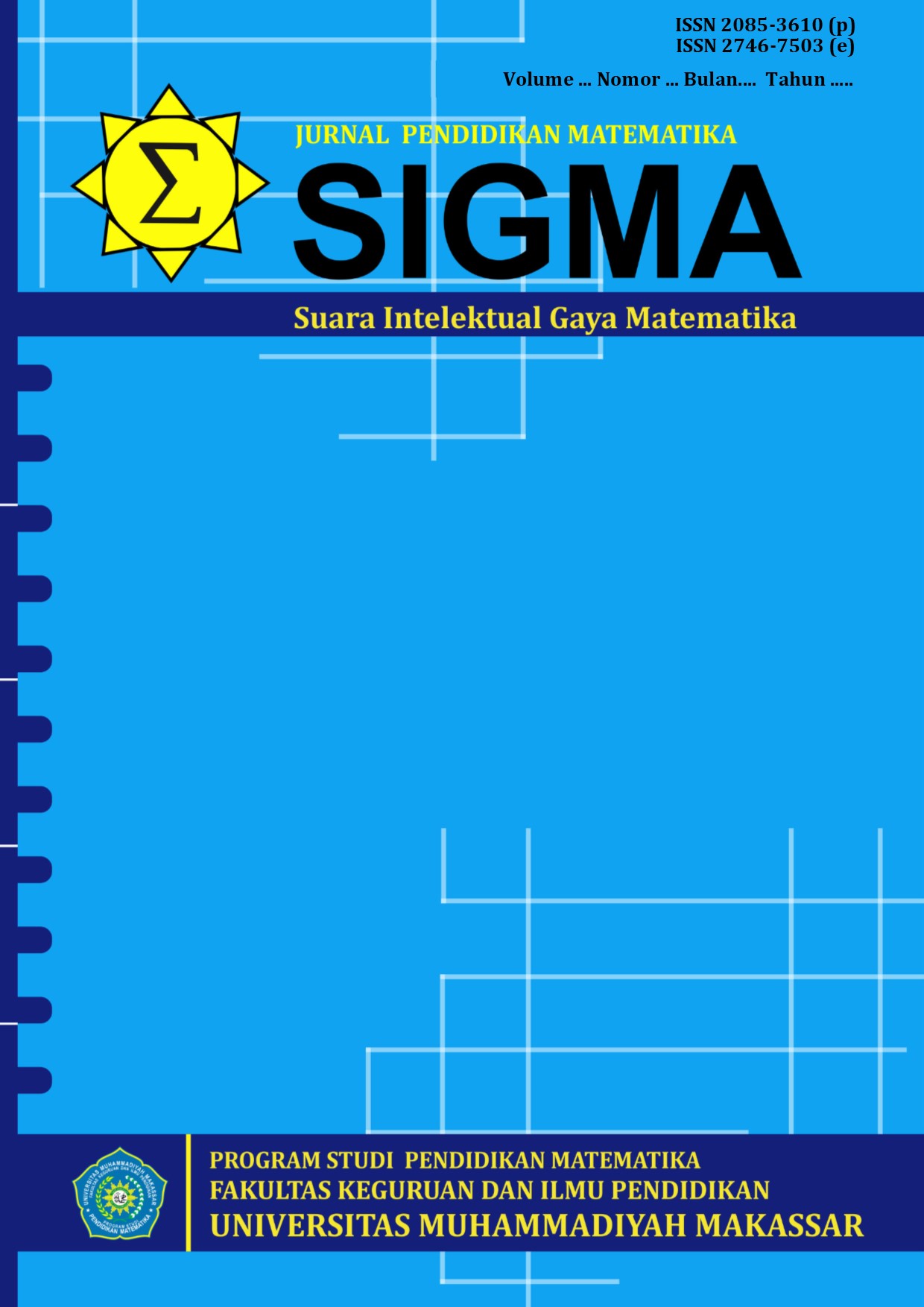PERBANDINGAN PENERAPAN MODEL PROBLEM BASED LEARNING DENGAN MODEL PEMBELAJARAN LANGSUNG TERHADAP HASIL BELAJAR SISWA
DOI:
https://doi.org/10.26618/sigma.v13i1.4617Keywords:
Model Problem Based Learning, Model Pembelajaran Langsung, Learning OutcomesAbstract
This study aims to find out if the application of PBL learning model is effective to students' math learning results, which involved 40 students at SMAN 17 Gowa in Gowa district. This type of research is Quasi Experimental Design with Nonequivalent Control Group Design design. The research instruments used are tests, analyzed using descriptive statistics and inferential statistics with t-tests. The results of this study showed that there are differences in average math learning outcomes of students who do not use the learning model and who use the PBL model. Implementation of PBL learning model effectively on students' math learning outcomes.References
Abdullah, J., Mohd-Isa, W. N., & Samsudin, M. A. (2019). Virtual reality to improve group work skill and self-directed learning in problem-based learning narratives. Virtual Reality, 23(461–471). https://doi.org/10.1007/s10055-019-00381-1
Arikunto, S. (2006). Prosedur Penelitian Suatu Pendekatan Praktek (Cet. I). Rineka Cipta.
Barrows, H. S. (1996). Problem-based learning in medicine and beyond: A brief overview. New Dir. Teach. Learn.
Burgess, A., Roberts, C., Ayton, T., & Mellis, C. (2018). Implementation of modified team-based learning within a problem based learning medical curriculum: a focus group study. BMC Medical Education, 18(74), 1–7. https://doi.org/10.1186/s12909-018-1172-8
Darmadi, H. (2014). Metode Penelitian Pendidikan dan Sosial. Alfabeta.
Dimyati, & Mudjiono. (2002). Belajar dan Pembelajaran (Cet. II). Rineka Cipta.
Ibrahim, N., & Fadzil, N. H. (2013). Informal Setting for Learning on Campus: Usage and Preference. Procedia - Soc. Behav. Sci.
Ibrahim, R. N. (2012). Kriptografi Algoritma Des, Aes/Rijndael, Blowfish untuk Keamanan Citra Digital dengan Menggunakan Metode Discrete Wavelet (DWT) Transformation. J. Comput. BISNIS.
Indah, N., Mania, S., & Nursalam. (2016). Peningkatan Kemampuan Literasi Matematika Siswa Melalui Model Pembelajaran Problem Based Learning Di Kelas VII SMP Negeri 5 Pallangga Kabupaten Gowa. MaPan: Jurnal Matematika Dan Pembelajaran, 4(2), 200–210. https://doi.org/10.24252/mapan.2016v4n2a4
Kurnia, I. A., Jalinus, & Siregar, S. N. (2017). Penerapan Model Problem Based Learning (PBL) Untuk Meningkatkan Hasil Belajar Matematika Siswa Kelas VIII SMP Negeri 16 Pekanbaru. Jurusan Pendidikan MIPA Universitas Riau, 4(1). https://jom.unri.ac.id/index.php/JOMFKIP/article/view/13757
Malmia, W., Makatita, S. H., Lisaholit, S., Azwan, Magfirah, I., Tinggapi, H., Chairul, M., & Umanailo, B. (2019). Problem-Based Learning As An Effort To Improve Student Learning Outcomes. International Journal of Scientifict & Technology Research, 8(09), 1140–1143. www.ijstr.org
Naim, S. N. J. (2017). Pengaruh Model Pembelajaran Problem Based Learning (PBL) Terhadap Kemampuan Pemecahan Masalah dan Hasil Belajar Siswa pada Materi Bentuk Aljabar Kelas VII SMP. Jurnal FKIP-Pendidikan Matematika, 11(1). https://simki.unpkediri.ac.id
Nurdyansyah, & Riananda, L. (2016). Developing ICT-Based Learning Model to Improve Learning Outcomes IPA of SD Fish Market in Sidoarjo. Jurnal Teknologi Pendidikan, 1(2), 929–940. https://journal.unesa.ac.id/index.php/jtp/article/view/1137
Paradina, D., Connie, & Medriati, R. (2019). Pengaruh Model Pembelajaran Problem Based Learning Terhadap Hasil Belajar Siswa di Kelas X. Jurnal Kumparan Fisika, 2(3), 169–176.
Ramadani, R., Mustamin, S. H., & Idris, R. (2017). Hubungan Antara Kreativitas Guru dan Gaya Belajar Siswa dengan Hasil Belajar Matematika Siswa Kelas X SMA Negeri 1 Bontomarannu Kabupaten Gowa. MaPan: Jurnal Matematika Dan Pembelajaran, 5(1), 82–95. https://doi.org/10.24252/mapan.2017v5n1a6
Setiawan, A., & Santosa, R. H. (2017). Efektivitas Model Problem Based Learning Ditinjau Dari Kemampuan Pemecahan Masalah Dan Kreativitas Matematis. Jurnal Pendidikan Matematika, 6(2), 41–47. http://journal.student.uny.ac.id/ojs/ojs/index.php/pmath/article/view/5980
Syarifuddin. (2017). Perbandingan antara Problem Based Learning dan Discovery Learning dengan Menggunakan pendekatan Saintifik. Daya Matematis: Jurnal Inovasi Pendidikan Matematika, 5(1), 27–48. https://doi.org/10.26858/jds.v5i1.3029
Umanailo, M. C. B. (2019). Discourse on the Consumerist Community Consumption. J. Soc. Sci. Res, 5(4), 1181–1186.
Umanailo, M. C. B., Handayani, N., Masniati, A., S. H. Makatita, &
Lisaholit, S. (2019). The Urbanization and Diversification of Farmland Namlea Village. International Journal of Scientifict & Technology Research, 8(8).
Wandini, R. R., & Sinaga, M. R. (2018). Games Pak Pos Membawa Surat Pada Sintax Model Pembelajaran Tematik. Jurnal Raudhah, 6(1). https://doi.org/dx.doi.org/10.30829/raudhah.v6i1.268
Yunus, M. (2016). Pengaruh Penerapan Pembelajaran Problem Based
Learning (PBL) Terhadap Hasil Belajar Matematika Siswa Pada Materi Himpunan di Kelas VII MTs Swasta Islamiyah Padang Maninjau. Jurnal Pembelajaran Dan Matematika Sigma, 2(2), 54–58. https://doi.org/doi.org/10.36987/jpms.v2i2.1247
Downloads
Published
Issue
Section
License
With the receipt of the article by the SIGMA: Jurnal Pendidikan Matematika Editorial Board and the decision to be published, then the copyright regarding the article will be diverted to SIGMA: Jurnal Pendidikan Matematika.
Universitas Muhammadiyah Makassar as the publisher of SIGMA: Jurnal Pendidikan Matematika hold the copyright regarding all the published articles in this journal.Universitas Muhammadiyah Makassar has the right to multiply and distribute the article and every author is not allowed to publish the same article that was published in this journal.
The manuscript authentic and copyright statement submission can be downloaded ON THIS FORM.

